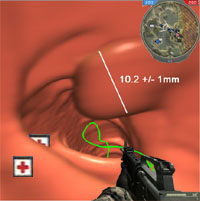February 23, 2007
SimHospital
 This week on CNE I blogged about how surgeons become better at laparoscopic surgery by playing computer games and how computer games might be good training for doctors or patients.
This week on CNE I blogged about how surgeons become better at laparoscopic surgery by playing computer games and how computer games might be good training for doctors or patients.
There are already SimHospital-like games and a plethora of educational games from immunology over neuroscience to patient simulators of varying complexity for medical education. Applications such as virtual colonoscopy are serious, but handling them definitely requires computer game skills. Given how this kind of virtual close examination of a patient's tomographic "shadow" is likely to become ever more important in the future diagnosis-care chain these skills are going to be in high demand.
However, it would be more interesting with games that taught potential patients how to become better patients and doctors to become better at different specialities. It seems to me that games that promote good self-maintenance (roleplaying games where people work hard on improving their avatars?) and deductive abilities might make better power patients, assuming of course people carry over those skills to other domains. The surgery skill study suggests that the hand-eye coordination and understanding of mediated reality games provide help, and games can improve peripheral attention and enumeration ability. But these are fairly low-level abilities. Maybe I have a too academic view of medical reality, but it seems to me the real benefits would be games that train high-level medical cognition.
Apropos educational games, mouse party has to be one of the strangest drug information animations I have ever encountered. It is strange because it is so focused on the microlevel and non-judgemental - personally I think this might be the best kind of drug information possible, but it is completely alien in the current war on drugs climate. Not to mention slightly cruel to the mice, but they do not seem to mind.
Posted by Anders3 at February 23, 2007 01:02 AM